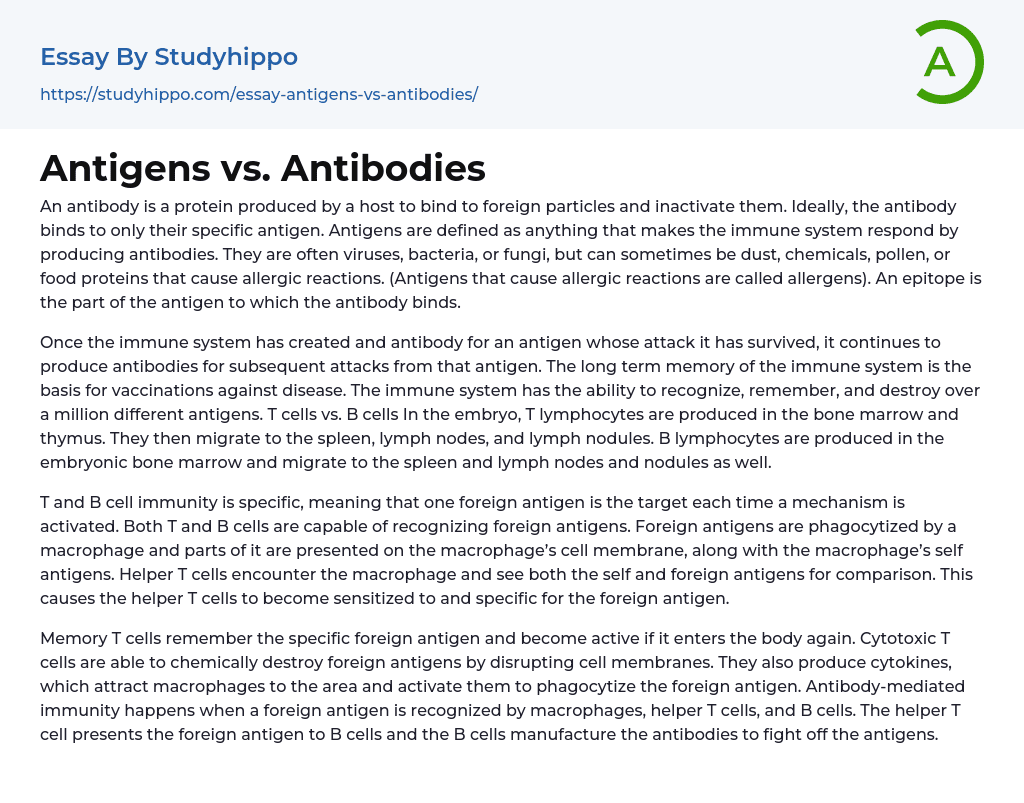The main function of an antibody is to attach specifically to antigens, such as allergens (e.g., viruses, bacteria, fungi, dust, chemicals, pollen, or food proteins), which are foreign particles. It is produced by a host and works by binding to the epitope of the antigen to render it inactive.
The immune system has the ability to create antibodies in order to protect against antigens it has previously encountered. This is the basis for vaccinations. Additionally, the immune system can identify and remove more than a million different antigens while retaining knowledge about them. T lymphocytes are produced in the bone marrow and thymus during embryonic development, then migrate to the spleen, lymph nodes, and lymph nodules. Similarly, B lymphocytes are initially formed in the embryonic bone marrow and also relocate to the spleen as well as lymph n
...odes and nodules.
Both T and B cells are components of the specific immune response and possess the ability to identify foreign antigens. The initiation of this process occurs when a specific foreign antigen is targeted. Through phagocytosis, a macrophage engulfs the foreign antigen and presents it on its cell membrane alongside its own self antigens. When helper T cells encounter the macrophage, they compare the self and foreign antigens, resulting in sensitization and specificity of the helper T cells towards the foreign antigen.
The memory T cells can remember and become active again when a particular foreign antigen enters the body. In contrast, cytotoxic T cells have the ability to chemically destroy foreign antigens by disrupting cell membranes and generating cytokines. These cytokines attract macrophages to the area and stimulate them to
engulf and break down the foreign antigen. In antibody-mediated immunity, macrophages, helper T cells, and B cells work together to identify the foreign antigen. The helper T cell presents the foreign antigen to B cells, which in turn produce antibodies to counteract the antigens.
- Microbiology essays
- Bacteria essays
- Cell essays
- Enzyme essays
- Photosynthesis essays
- Plant essays
- Natural Selection essays
- Protein essays
- Viruses essays
- Cell Membrane essays
- Human essays
- Stem Cell essays
- Breeding essays
- Biotechnology essays
- Cystic Fibrosis essays
- Tree essays
- Seed essays
- Coronavirus essays
- Zika Virus essays
- Pregnancy essays
- Death essays
- Asthma essays
- Chronic Pain essays
- Diabetes essays
- Infection essays
- Infertility essays
- Pain essays
- Sexually Transmitted Disease essays
- Cholesterol essays
- Epidemic essays
- Pathogen essays
- Symptom essays
- Water supply essays
- Myocardial Infarction essays
- Chronic essays
- Hypertension essays
- Black Death essays
- Breast Cancer essays
- Down Syndrome essays
- Apoptosis essays
- Tuskegee Syphilis Experiment essays
- Type 2 Diabetes essays
- Cloning essays
- Medical Ethics essays
- Patient essays
- Therapy essays
- drugs essays
- Cannabis essays
- Aspirin essays
- Cardiology essays




